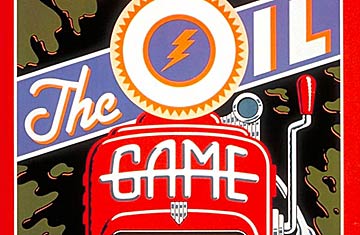
From Saudi Arabia to Sumatra, from Nigeria to the North Sea, up comes the oil. And every day, 24 hours a day—at a rate of 30,000 gallons per second—the petroleum-thirsting world swills it back down in desperate, energizing gulps.
Welcome to the Oil Game—the highest stakes, most dazzling game on earth. See the world's largest, wealthiest companies match wits with lumbering bureaucracies. Behold developing nations become Croesus-rich overnight. Watch capitalists try to raise billions for offshore drilling rigs taller than the Empire State Building, for supertankers bigger than aircraft carriers, for refineries that look like visions out of Star Wars. Be amazed as mesmerized millions of people place their bets on a future of abundant energy and hope for the best, in a game with rules so complex and fast changing that practically no one can understand them.
It is, of course, the craving for crude that keeps the game going. Petroholic economies everywhere remain excessively hooked on Demon Oil. When consumption periodically eases back, as it has been doing moderately in the industrial nations during the past two or three years, it is not so much because of effective governmental policies or the shift to alternative fuels as it is because of economic weakness and fitful growth at home.
On paper, the U.S. at long last seems to be tempering its petroleum profligacy. Annual growth in demand subsided from 5% as recently as 1977 to 2% last year. But nearly all the improvement has come from conservation by industry, while individuals blithely go along wasting fuel. Not only has demand for gasoline, which accounts for one-third of the nation's fuel bill, continued to grow fast, but U.S. dependence on foreign oil has increased by nearly 50% since the 1973-74 Arab oil embargo, and this year will reach some $50 billion.
For the second time in a decade, energy scare stories have become the stuff of headlines: motorists who confront the prospect of a summer of gasoline shortages at $1 per gal.; homeowners who have visions of dollar bills fluttering up the chimney every time the oil burner in the basement trips on. Angry and resentful, people are blaming the one institution that not only grows richer every time there is an oil squeeze, but is as close at hand as the nearest service station: the $360 billion-a-year U.S. oil industry.
According to a recent CBS-New York Times poll, 69% of the public still believe that gasoline prices are rising not because there is an energy crisis but merely because the oil companies want to make more money. In a sentiment that is widely shared, Margaret Dadian, vice president of an Illinois sales company, complains: "There is a shortage all right, but not as serious as we are told it is. It is more a question of oil companies' holding back until they can get higher prices. We have Arabs of our own in this country."
All around the U.S., the lament is the same: in ways both devious and sinister, and too mystifying to understand, Big Oil is somehow out to rip off the public. Says Irene McMackin, a Milwaukee public relations consultant: "I just don't feel the crisis is real. I don't trust the oil companies." Adds William Meier, an Indiana insurance agent: "My emotional
